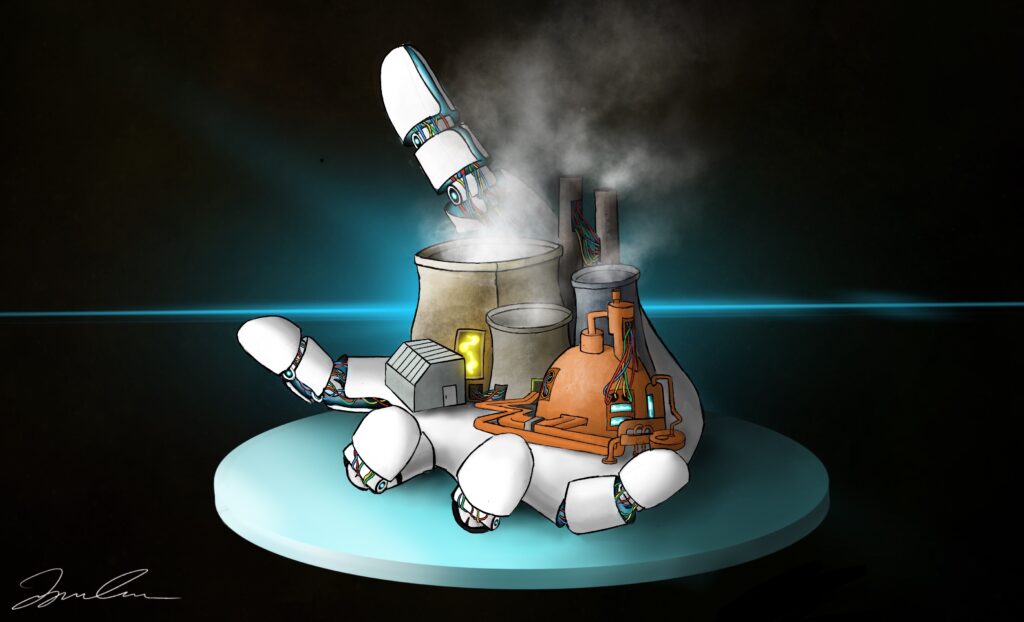
Significant advancements in artificial intelligence (AI) have been made recently, leading to discussion regarding its potential applications, with its utility in the energy sector being one of the most promising.
Electric power accounts for about 25 percent of all greenhouse gas emissions, a close second to transportation, which holds the largest share at 28 percent. Electricity is produced through a variety of methods—coal, natural gas, and hydropower energy generation being the most common. However, each of these methods have detrimental impacts on the environment. Coal-fired and natural gas powered generation, the largest sources of energy production, release air pollutants and greenhouse gasses that can significantly increase the rate of global warming, and creating the infrastructure for hydroelectric projects often requires the destruction of many natural habitats. Despite the environmental damage caused by energy production, about two-thirds—roughly 67 quadrillion Btu—of electric energy is wasted every year as a result of generation losses and standby power.
Generation losses and standby power are products of the inefficiencies in electric production. During coal or natural gas combustion, fuel is burned to produce heat, which is essential to electricity production. However, a significant portion of this heat is lost in the thermal energy conversion process. Along with this, wasteful electricity consumption practices—leaving the lights on when not used, excessively using washers and dryers, and leaving devices plugged in when they’re done charging—contribute to upwards of a fifth of overall energy waste. Thus, minimizing heat waste and energy consumption is incredibly important to increasing energy productivity and minimizing environmental harm. This is where AI, or artificial intelligence, can make a difference.
Implementing AI algorithms that monitor fuel combustion and energy consumption can significantly reduce energy waste in both power plants and households. By parsing through consumption and fuel combustion data, algorithms can identify inefficient energy practices and serve to mitigate or eliminate them. Additionally, more efficient methods can be modeled through fuel combustion simulations that use AI generated environments and predictive analytics. AI also has some utility in predicting optimal fuel combustion settings, such as fuel-air ratios and temperatures, to facilitate more efficient energy production. However, the most promising application of AI in the energy sector is heat waste recapture—preventing generation losses through reusing heat released from the combustion process. This would be the most significant step forward for energy efficiency, as heat loss is the largest contributor to energy wastage.
AI can also mitigate waste by optimizing energy expenditure in households. For example, incandescent lights can be automatically turned off when not in use, and everyday appliances detached from electricity when households are vacant.
Though AI-driven energy production is far from being the norm, power generation companies like Siemens Energy are already making strides toward a more sustainable future by developing autonomous power plants. The number of AI implementations in the energy sector is virtually infinite, and with advancements happening rapidly, we could see a massive decrease in energy expenditure that would help reduce our environmental impact.
Works cited
- EPA (U.S. Environmental Protection Agency). “Sources of Greenhouse Gas Emissions.” https://www.epa.gov/ghgemissions/sources-greenhouse-gas-emissions
- IEA (International Energy Agency). “Data and Statistics.” https://www.iea.org/data-and-statistics
- Frank Krull. “Unleashing AI in Power Plants.” Siemens Energy, February 16, 2022. https://www.siemens-energy.com/global/en/news/magazine/2022/unleashing-ai-in-power-plants.html
The views and opinions expressed are those of the authors and do not necessarily reflect nor represent the Earth Chronicles and its editorial board.





